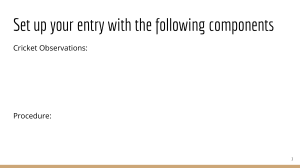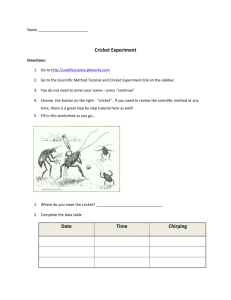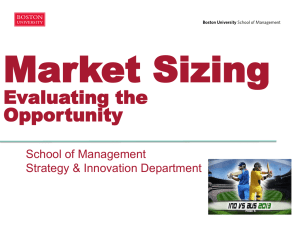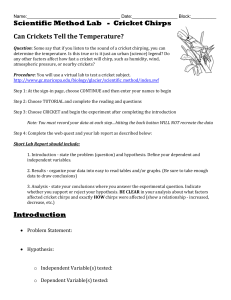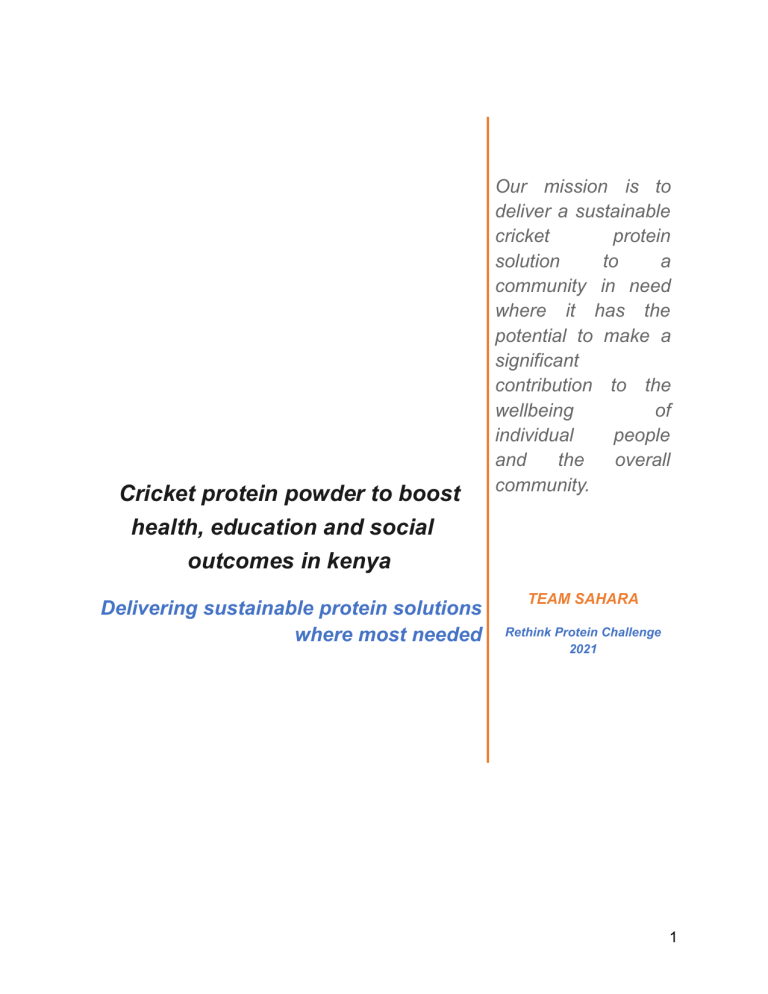
Cricket protein powder to boost health, education and social outcomes in kenya Delivering sustainable protein solutions where most needed Our mission is to deliver a sustainable cricket protein solution to a community in need where it has the potential to make a significant contribution to the wellbeing of individual people and the overall community. TEAM SAHARA Rethink Protein Challenge 2021 1 2 Artist's Impression of Solution 3 1. Vision & market Our team vision is to boost health, education and social outcomes in Kenya with a sustainable protein solution for local malnutrition problems. Our mission serves a dual purpose; to connect nutritionally underserved communities with the economic markets driven by choice and affluence by creating an effective revenue model an economic recycling between the two. A model that is environmentally sustainable and creates further opportunities for these communities to become self-sustaining. We propose to start this social venture with an insect protein-based solution. According to combined efforts by the FAO, WFP, UNICEF, WHO and IFAD in their 2020 report on ‘food security and nutrition’; six years after the world committed to end hunger, food insecurity and all forms of malnutrition, we are still off track to achieve this objective by 2030. In 2020, the COVID-19 pandemic, as well as unprecedented desert locust outbreaks in Eastern Africa, obscured economic prospects in ways no one could have anticipated, and the situation may only get worse if we do not act urgently. Therefore, there is a need for alternative animal protein sources such as insects. Research carried out by our partners INSECTIPRO FARMS in the past year indicates that Kenya has a high rural population of about 72% and a capital city that depicts extreme states of socioeconomic factors, with the largest slums in the region and changing people’s attitudes in regards to entomophagy will require a multi-stakeholder approach in order to trigger a mind shift. Based on their nutritional profile (the whole range of essential amino acids, fibre, zinc, iron), crickets qualify to be a therapeutic food for vulnerable populations who have low purchasing power or are disconnected from supply chains of fish, meat and other protein source alternatives. The market Our potential customers/market segments include; middle-class individuals who would probably buy alternative/trendy food products; nutritionally conscious consumers ordinary consumers in the mass market willing to pay more for cricket enriched wheat and maize flour; healthy lifestyle consumers - people whose primary interests are health and fitness; business/industrial clients - flour millers, bakers, institutions, restaurants; school feeding programmes in partnership with charitable organizations and Governments and Entomophagists - people who actively consume insects, especially those in the low- income areas like Kibera. In Kibera, our partners: SOMO will handle product packaging and ROCK will be in charge of marketing and distribution of the products. Kenyan farmers have been trained by local universities and previously participated in cricket farming but without an actual market for products,unable to commit to the farming process. A tasting exercise of cricket-based porridge revealed that a price-sensitive population would be willing to pay 4 Ksh 100 for a kilo of porridge. Compared to other porridge flours, the suggested price is on the lower end, since a popular brand of porridge flour, Famila retails at Ksh 130. However, the price range could stretch to Ksh 230, such as a kilo of Amaranthus porridge flour from Winnie’s Pure Health. The market needs In Kenya,insect consumption is a tradition among communities especially in times of food insecurity.The Kibera community is calling out for sustainable foods that meet nutritional needs, including protein. Cricket protein powder provides all the essential amino acids, and combined with the chitin (exoskeleton),a great source of minerals, essential oils and probiotics. To ensure that products enriched with cricket flour remain affordable for the mass markets, percentage replacement has to be well balanced. Team Sahara’s market research team in Kibera carried out a taste test to determine consumer acceptability of this product and the community responded quite well, watch the video here. For InsectiPro to enrich regular food such as maize flour, which averagely retails at Ksh 110, it is paramount to ensure a good balance between value addition and price, for it to be successful in the market. Literature review shows that, 5% to 10% replacement of flour with cricket powder, would improve the nutrients in the flour without negatively impacting its sensory properties. In order to create various hypothetical scenarios of the final product, the following assumptions will be applied; 1 Kilo of cricket flour retails at Ksh. 1, 800 1 Kilo of maize flour is Ksh 110 The Price cap for maize flour in the mass market is Ksh 200 (Based on the price of Winnie’s Pure Health enriched maize flour) ● 0.5 Kilos of premium pure millet flour is Ksh 470 (Based on Healthy U pricing) ● ● ● Meaning, an enriched product with 5% and 10% would cost a minimum of about Ksh 290 and 460 respectively. Based on these prices, the products would not be competitive in the mass market, and thus would be better positioned in the market among other premium flours. As InsectiPro grows, so will efficiency in production; which will allow for cricket enriched products to be cheaper and thus competitive in the mass market. InsectiPro aims at achieving a retail price of Ksh 600-700 per kilo of cricket powder in the near future. 5 Solution Our proposed solution builds upon a tried, tasted and tested indigenous food that is bountiful during climate change disruptions such as heavy rains and flooding. It is centred around the use of powdered insects to make an array of products to fit our market’s needs. Through SOMO and InsectiPro, we were able to bring packed products into the market as we tried to decipher how much the people of Kibera were willing to pay for our products. Most people mentioned that they would willingly pay ksh 50 for the 50g sachet, see the video here. The products depicted here were merely samples and not for sale as InsectiPro is still awaiting certification for their product and packaging from the Kenya Bureau of Standards (KEBS). With SOMO, we tried to mirror packaging of our prototype in brown paper bags but these are expensive and do not hold the product well. We are now considering using glass containers as these are more affordable than the brown bags and we can introduce the concept of pfand where buyers can choose to either get them refilled or exchanged at a fee. The market studies referred to in this report were conducted by InsectiPro farms in various towns in the Nairobi Metropolitan Area. Data was collected through structured interviews with the aid of a questionnaire. Most of the respondents, 81.2% were found to be aware of entomophagy, as opposed to 18.8% who did not know insects are edible. Out of those who were aware of entomophagy, 36% of them had previously eaten insects; termites being one of the most consumed insects at 80.3% among other insects such as locusts, grasshoppers and crickets. Of the respondents, 38%, who had never consumed insects before, expressed disgust towards insects and a reason for not eating them. These findings were reported to be consistent with previously existing research perceiving that most Western countries, especially North America and Europe, perceive entomophagy with disgust. When presented with a question on their preferred state of insect-based products that would appeal to potential consumers; 93.3% of respondents preferred crickets as a flour or powder, followed by 50.8% who preferred the cricket powder premixed with staple foods, i.e., maize, wheat, porridge flours, as opposed to soups and spices. This preference for insect powder in staples is therefore aligned to our initial assumptions and proposed solution for this venture. Working in collaboration with InsectiPro and other insect producers, some of our potential product lines will include; maize flour enriched with cricket flour, wheat flour enriched with cricket flour, cricket-enriched spice cubes, porridge flour enriched with cricket flour, pure cricket powder for baking and smoothies; cricket based snacks- protein bars, cricket based breakfast cereals such as Weetabix, cricket based pastries- cakes, buns, bread; pure cricket powder-packed with high energy, electrolytes, which would be ideal for sport, fitness and wellness personalities. When questioned on the factors that influenced their shopping decisions, 6 the correspondents mentioned availability of product to be the most effective followed by pricing and taste, with peer pressure being the least ranked. InsectiPro listed that the most preferred places to shop in Nairobi are supermarkets followed by local shops reflected by 66.1% and 23.9% respectively. A separate study on Consumer Behaviour in Kenya had similar findings whereby supermarkets were most preferred at 53% then shops at 13%, meaning that supermarkets are a good avenue to reach a majority of the residents in Nairobi. Supermarkets cater for customers from all market segments because of their wide range of products. Team Sahara, acting as distribution partners for InsectiPro aims to leverage on this knowledge by planning to hit supermarket shelves once InsectiPro products have received the stamp of approval from KEBS to solidify our place in the ‘affluent’ market. With a wide range of products, we should be able to strategically price our products dependent on the market segment we are targeting. What is unique about our solution? The time to market necessary to develop the product is extremely short, thanks to the fact we meet a real necessity giving a simple and highly-accepted solution. The following factors will add to the value of our product in the market: affordability - cutting cost barriers will actually help to expand the idea and raise awareness and acceptability of the cricket flour; nutritional definition of crickets - rich in iron and zinc which are essential in boosting immunity and metabolism in the body; multi-purpose use - the insect flour can be adapted by adding it in various products. Team Sahara experimented the flour with bhajia’s (deep fried snacks), cakes, etc. and as a wholesome snack - The whole roasted crickets have a uniquely nutty, slightly smoky essence, with just a hint of astringency on the back of the palate. It’s a very pleasant umami flavor which deepens with roasting. Technical feasibility The edible insect market is in rapid and continuous growth and now is the time for us to take action to further educate the community and bring this solution to the people. House cricket and mealworm could help fill the existing protein gap with ease. We believe that an increase in the demand of insect protein would result in a significant price reduction of the product as a direct and positive effect. In the short term, as InsectiPro works on scaling up production, we would have to outsource/import insect products from a reputable company with defined safety standards to ensure product uniformity as we plan our entry into the market while in the long term, the production with the full value chain has to be clear and tested. We are in 7 the process of collecting different quotations with the help of our partners Bygora - A digital B2B marketplace to for the buying and selling of novel proteins, giving access to several insect species and mass producers like Agronutris who are behind the recent decision made by EU Member States allowing for the commercialization of dried yellow mealworm for the EU markets.Cricket-based products are available globally on online stores, whereby they retail from €40 to €300 per kg which are high due to low supply of crickets. Especially compared to other species like the mealworm (up to €20-50/ton if sourced from Thailand), we are warming up to the idea of adding mealworm to our list since cricket production costs are high and thus less accessible to vulnerable target groups. A diversification in insect species could also help keep prices at bay. In the long run, it is expected that the price of crickets will reduce with improved systems and efficiencies in production, and growing economies of scale. Besides that, the industry is still in early stages of development, especially in Kenya; hence the higher production costs and higher prices. In the beginning, before our project manager can return to Kenya to foresee the registration of this venture as a legal entity, we will rely on our partnership with InsectiPro and SOMO by leveraging on their legal statuses to operate as distributors of their products. We will use the remainder of this year to further study the market and its needs to better understand the quantities we would need to supply as well as properly outline the delivery and supply cycles both within and outside of the limits of Kibera. Once in Kenya, InsectiPro is willing to allow Team Sahara to copy-paste their production model in Coastal Kenya where Winnie has access to a piece of land on which we aim to establish our first insect farm and production can begin. 8 9 10 Annexes In case you missed them above here are the videos Team Sahara prepared to help visualize the situation in Kibera and the communities take on our solution; 1. https://youtu.be/kfkjd7LEDFA - An introduction to insect protein 2. https://youtu.be/ExgxFeImi9s - Bringing PAWA Box to the people 3. https://youtu.be/AGPqhkybWRE - A short skit by our market research team and local actors to help highlight the plight of several families in the slum. We have included our other documents, including our financial forecast for starting January 2022 as we await KEBS certification for the insect product in this google folder for your review. 11
